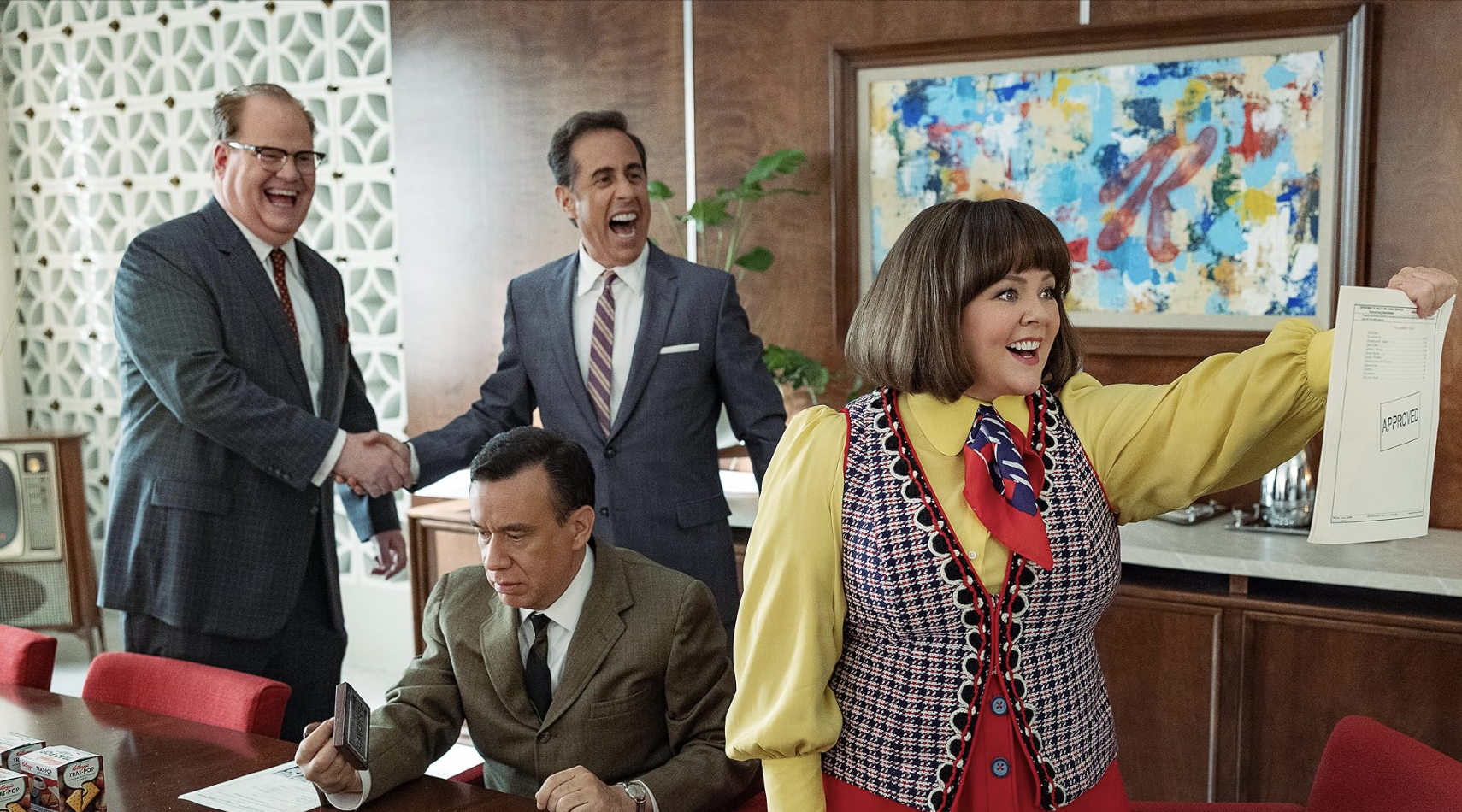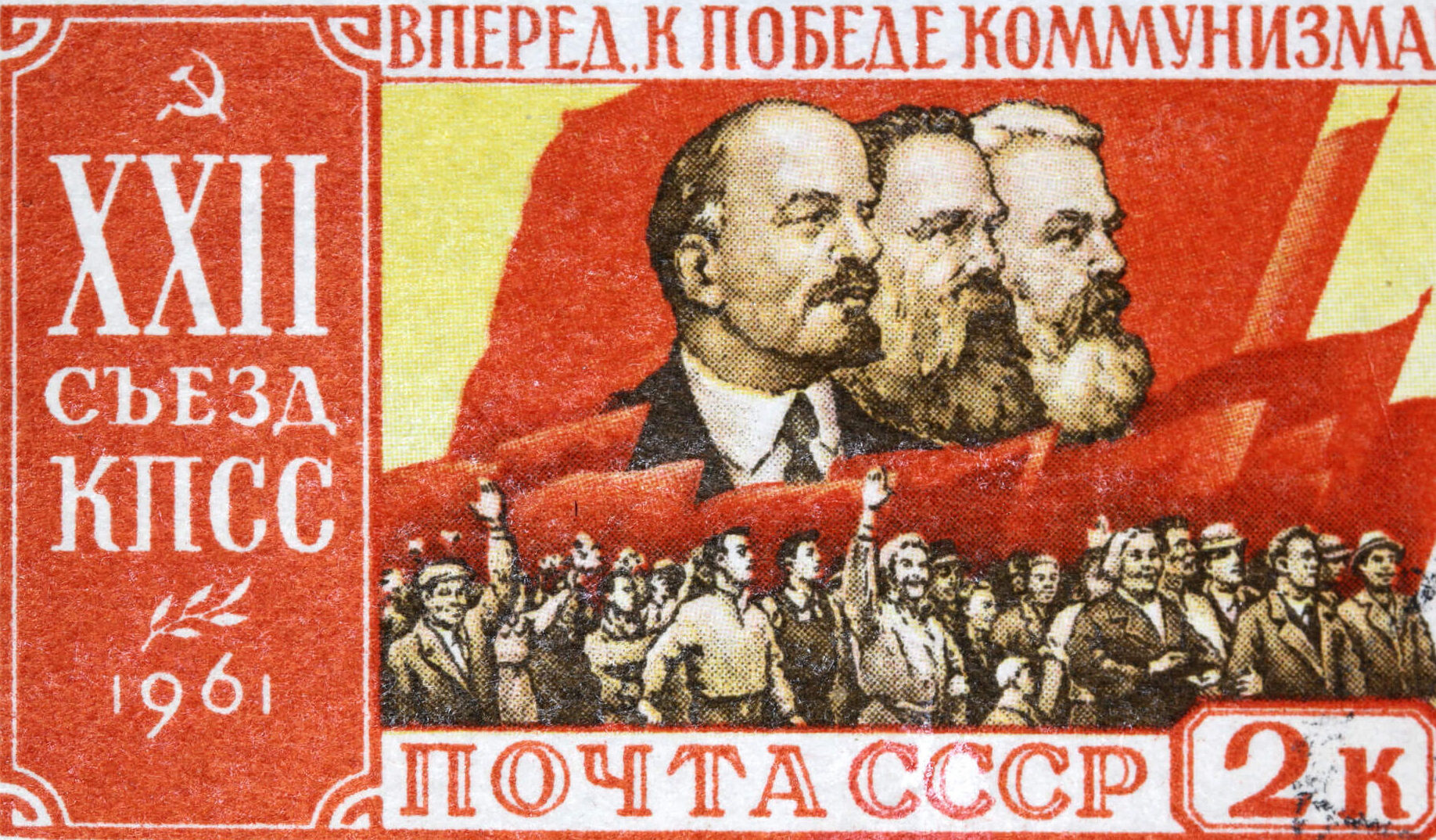One of my favorite G. K. Chesterton observations is “He is a [sane] man who can have tragedy in his heart and comedy in his head.” That’s partly because I like to joke around a lot and partly because I think he was right.
Unfortunately, you won’t find much to laugh about in Jerry Seinfeld’s new comedy about the invention of Pop-Tarts, Unfrosted, now streaming on Netflix. The idea is fun enough: breakfast cereal giants Kellogg’s and Post battle it out in 1963 against a backdrop that oozes the pop culture of that era. X-Ray Spex. Walter Cronkite (played by Kyle Dunnigan). The Twist. John F. Kennedy (Bill Burr). Silly Putty. It’s all there.
Seinfeld plays Kellogg’s executive Bob Cabana, who, along with the stuffy Edsel Kellogg III (Jim Gaffigan) and barb-laden Donna “Stan” Stankowski (Melissa McCarthy), races against his competitors—the cereal tycoon Marjorie Post (Amy Schumer) and her minion Rick Ludwin (Max Greenfield)—to see which company can make a breakfast cake first. Also included are Snap, Crackle, and Pop; Tony the Tiger (Hugh Grant); the Quaker Oats Quaker; Toucan Sam; and just about every other cereal character of the era. Some of the characters were actual cereal executives, portrayed in the movie as human cartoons.
If this over-the-top spectacle convey how intentionally silly this movie is meant to be, just three minutes into the film, Kellogg III says while glancing at the newspaper, “Vietnam, that seems like a good idea!” This kind of obvious joke about the foibles of the 1960s era gives viewers a head’s up about what to expect for the next hour and a half.
But while this concept is fun—and there are a few zingers that definitely had me laughing—the overall mixture of history and camp just never seems to work. Scenes that Seinfeld and his cowriters thought were funny on the drawing board just aren’t on the screen. Despite its star-studded cast—Christian Slater as a gangster milkman should be funny, right?—too much of the movie was like a Pop-Tart without frosting: bland and disappointing.
The Unfrosted flop is a shame given Jerry Seinfeld’s reputation as one of the best comedians of his generation (and since Netflix reportedly gave him $14 million to do what he wanted). His recent condemnations of what’s wrong with this generation of comedy, both production and promotion, have ironically been the best things to come out of Unfrosted.
While promoting the film in late April, Seinfeld said people will “always need” comedy (Chesterton would have agreed), but it is not as readily available to them as it once was.
“It used to be, you would go home at the end of the day, most people would go, ‘Oh, “Cheers” is on. Oh, “M*A*S*H” is on. Oh, “Mary Tyler Moore” is on. “All in the Family” is on.’ You just expected, there’ll be some funny stuff we can watch on TV tonight,” Seinfeld told the New Yorker.
My Seinfeld fandom was confined to watching reruns of his monster hit syndicated show with my parents over dinner. We all loved it. It was a family custom. We had a soft spot for Jerry’s wacky neighbor Kramer (Michael Richards). Boy, did my Dad love Kramer.
Seinfeld’s complaint is that the comedy Americans once enjoyed as a culture and as everyday ritual just doesn’t exist anymore.
In one famous episode, Kramer accidentally lights a Puerto Rican flag on fire during New York City’s Puerto Rican Day Parade and then stomps on it to extinguish the flames. This leads to angry mobs attacking Jerry’s car.
It stirred controversy at the time, but that episode probably wouldn’t even be acceptable today. Do Americans still have comedy like this now? Seinfeld says no.
“Well, guess what—where is it?” he asked. “This is the result of the extreme left and P.C. crap, and people worrying so much about offending other people.”
Seinfeld attempts to lampoon political correctness in Unfrosted, but even that isn’t very funny. In Unfrosted, his character threatens to quit the business and run off and become a hobo. Kellogg III admonishes him, “You can’t say ‘hobo’ anymore. They prefer ‘bum’!”
Seinfeld told the New Yorker, “HBO knows that’s what people come here for, but they’re not smart enough to figure out, How do we do this now? Do we take the heat, or just not be funny? And what they’ve decided to be is, Well, we’re not going to do comedies anymore.”
Instead, he said, the networks seem to have given up: “There were no sitcoms picked up on the fall season of all four networks. Not one. No new sitcoms.”
Seinfeld’s complaint is that the comedy Americans once enjoyed as a culture and as everyday ritual just doesn’t exist anymore. When Melissa McCarthy’s character in Unfrosted reads MAD magazine, she exclaims, “Boy, they don’t pull any punches!” Generations of boys grew up reading the often wild and outrageous MAD. But nothing like it exists today.
The most poignant point in Unfrosted is not a punchline. In one scene, El Sucre (Felix Solis), a sugar dealer, who acts like a drug lord, has a ventriloquist executed for offending him. Afterward, Sucre says, “It’s such a hard job making people laugh, but so important.”
He’s right: it’s very important. When Seinfeld or anyone else criticizes the “woke” left for ruining comedy, leftist critics often assume this means that he or others who share his views simply want more racially tinged or bigoted material in our entertainment. But the critique of P.C. comedy is much deeper than that.
Comedy requires that you disrupt people’s preconceived notions and make them see things differently. There are more barriers for comedians to do this today than there have ever been since the comedy legend Lenny Bruce was being arrested for making sexually explicit jokes in the early 1960s, the same era in which Unfrosted takes place. The forces of P.C. unfunniness have been around for a long time.
But today’s barriers aren’t obscenity laws like they were for Bruce—though some of the contemporary debates over “hate speech” show a real thirst for new speech laws—but a culture where too many are too afraid to challenge elites and their arbitrary rules about what we can say and think. The “extreme left” really is allowed to enforce its “P.C. crap” too often, to everyone’s detriment.
Jerry Seinfeld says this now because he sees it and he hates it. We all end up consuming more and more tragedy—24-hour cable news, depraved social media, violence, drama, despair—and less and less comedy. This imbalance is not good for anyone’s health, mentally, spiritually, even physically.
Saner men should speak out. One is. Good.
Now, if Jerry Seinfeld could only get back to being funny—despite all the forces against him.















